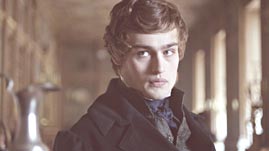Teachers' Domain - Digital Media for the Classroom and Professional Development
User: Preview


Source: MASTERPIECE: "Great Expectations"


MASTERPIECE is funded by Viking River Cruises, with additional support from public television viewers, and contributors to The Masterpiece Trust, created to help ensure the series’ future.
In this video excerpt from the 2012 MASTERPIECE adaptation of Charles Dickens's Great Expectations, months have passed since Pip received the news that a mysterious benefactor has provided money for his education as a gentleman. When Joe Gargery—the kindly blacksmith who helped raise Pip—unexpectedly comes for a visit, Pip, embarrassed by Joe's shabby clothes and working-class accent, can hardly look at the man who befriended him and taught him a trade. Joe remarks, "You look different." Pip tries to dismiss the comment. "It’s just a suit," Pip replies. But Joe understands that Pip is not only ashamed of him, but doesn't want to be reminded of his humble beginnings. Pip's unkind treatment of Joe allows the viewer to begin to see how money and a rise in status alone may not create a true gentleman.
When Mr. Jaggers first appears at the forge in Great Expectations, he tells Pip that he has come into a “handsome property,” and, according to the wishes of his mysterious benefactor, be “immediately removed from his present sphere of life and from this place, and be brought up as a gentleman—in short, as a young fellow of great expectations.” He further explains, “…although I have used the term ‘expectations’ more than once, you are not endowed with expectations only. There is already…a sum of money sufficient for your suitable education…”
Pip goes to London and learns, at least outwardly, to be a gentleman. He learns manners, how to dress and talk, what is fashionable, and how to spend his time in idle gentlemanly pursuits—cards, parties, and so on. Throughout the story, Pip is uncomfortably aware that his status in society as a gentleman has been achieved at some cost. When he makes up excuses for not staying with Joe on one of his trips home, Pip muses, “All other swindlers upon earth are nothing to the self-swindlers, and with such pretences did I cheat myself.” His journey to become gentleman, therefore, is really an inner journey. In this regard, Pip doesn’t truly become a gentleman until he learns the meaning of honesty, responsibility, compassion, and love.
The definition of the word “gentleman” in Victorian England was rather complex. Certainly, a man born into a noble family was considered a gentleman. Like Herbert Pocket, however, he might not be a man of means. Through a combination of money, education, and respectability, a man could become a gentleman—as Pip is expected to become. True gentlemen were also supposed to possess certain moral qualities—kindness, generosity, and trustworthiness. Yet Bentley Drummle, a supposed gentleman by birth, is shown by Dickens to be as coarse and cruel, if not more so, as any commoner.
The two father figures in Great Expectations—Joe Gargery, the blacksmith, and Abel Magwitch, the convict—are each shown to possess the true qualities of a gentleman. Magwitch, initially brutal and violent, is redeemed by his steadfast love for Pip. (The swindler Compeyson, who gets a lighter prison sentence because he is perceived as a gentleman, is far more vile than Magwitch.) Joe Gargery—humble, plain-spoken, and devoted to his family, is perhaps the most gentlemanly character of all. When Magwitch is apprehended and confesses to stealing food from the forge, Joe famously says, “We don’t know what you have done, but we wouldn’t have you starved to death for it, poor miserable fellow-creatur.”
Joe’s visit to London reveals the superficiality of Pip’s new status as a gentleman, as well as his own fundamental goodness. In the film, Joe shows up unexpectedly at Pip’s club. Pip is embarrassed by Joe’s accent, clothes, and manners, and is concerned what the other “gentlemen” at the club might think. Hurrying back to his rooms, Pip makes feeble excuses as to why he has not written or visited. Joe, although hurt by Pip’s rejection, understands, forgives Pip, and departs. “If there’s been any fault at all to-day, it’s mine,” he tells Pip in the book, “You and me is not two figures to be together in London…I’m wrong out of the forge, the kitchen or off th’meshes…And so God bless you, dear old Pip, old chap, God bless you!”
Although Dickens himself had “great expectations” as a young man, and hoped to become a gentleman, he is sharp in his analysis of society’s hypocrisy, superficial labels, and double standards. Pip’s tale is a cautionary one, and as valid today as it was when Great Expectations was written over 150 years ago.
Of the many life lessons Pip must learn, the true meaning of being a gentleman is one of the most important ones. This clip provides insights into how Pip’s “great expectations” begin to change him, and not always for the better. Joe Gargery is presented in contrast to the idle and immoral “gentlemen” (personified by Compeyson and Bentley Drummle) Pip has begun to meet.
Before watching the video:
While watching the video:
After watching the video:
For more about how to use MASTERPIECE to help you teach Charles Dickens, see the MASTERPIECE Teacher’s Guides, which contain discussion questions, activities, and background information. Teaching Dickens explores Oliver Twist, David Copperfield, Little Dorrit, and The Old Curiosity Shop. An individual guide is provided for A Tale of Two Cities. You may also wish to use the resources in the Charles Dickens Book and Film Club.
 Loading Standards
Loading Standards